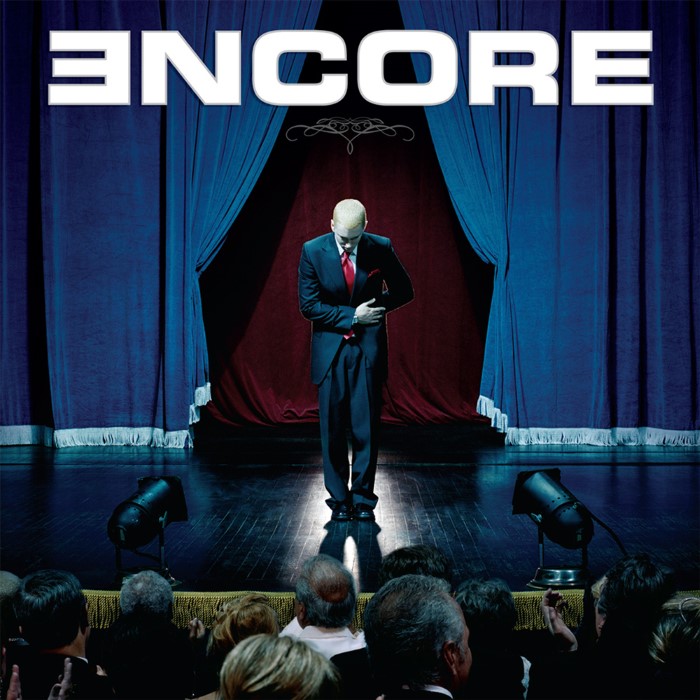Encore by Eminem

Encore is the fifth studio album by American rapper Eminem. Its release was set for November 16, 2004, but was moved up to November 12 (coincidentally, exactly eight years to the day his debut album, Infinite, was released) after the album was leaked to the Internet. Encore sold 710,000 copies in its first three days. Encore sold 1,582,000 copies in its first two weeks of release in the United States in November 2004, and was certified quadruple-platinum in mid-December. As of May 13, 2012, it had sold 5.288 million copies in the US. Nine months after its release, worldwide sales of the album stood at 11 million copies. Critical reception was generally positive. However, most critics and fans alike did note the subpar quality of the lyrics, which were more simplistic when compared to his previous albums. The album was nominated for three Grammys at the 48th Annual Grammy Awards including for Best Rap Album but lost to Kanye West's Late Registration. The album made digital history in becoming the first album to sell 10,000 digital copies in one week.
There’s an interview that came out around the release of <i>Encore</i>, in which you can see Eminem sitting in the middle of the empty football field he’d performed in just a few days earlier. It was amazing, the interviewer says, seeing 50,000 people—from young kids to middle-aged men—singing along with <i>you</i>: “Your power has reached an apex.” Em shifts in his folding chair and smiles, then admits: “That makes me nervous.” Of course it does. 50,000 people? And you, having gone from a $5.50-an-hour grill-cook job to being on the short list for <i>Time</i> magazine’s Person of the Year—all in just five years? The pressures of fame had been a subject of pop music since David Bowie’s <i>The Rise and Fall of Ziggy Stardust and the Spiders From Mars</i>, but Bowie didn’t have to deal with people indirectly blaming him for school shootings. No wonder 2004’s <i>Encore</i> felt so agonisingly mixed-up: <i>The Eminem Show</i> was, in a way, the last word he had on all this stuff, but that didn’t mean people stopped wanting more. “We as Americans” was chilling and “Yellow Brick Road” one of the realer apologies Eminem offered on record—not to mention one of the rare examples of his narrative side coming to the forefront. As for oddball cuts like “Big Weenie” and “Rain Man”? Well: “Every day I had a pocketful of pills, and I would go into the studio and goof off,” Eminem said later. The tension between who he’d been, and who the world increasingly expected and assumed him to be, had never been clearer. Five years earlier, Eminem had joked that if life ever got too good, he’d give up and start writing love songs. “’Cause all I ever wanted to do was just make you proud/Now I’m sittin’ in this empty house just reminiscin’/Lookin’ at your baby pictures, it just trips me out,” he rapped on “Mockingbird,” which is about as close as he ever got.
